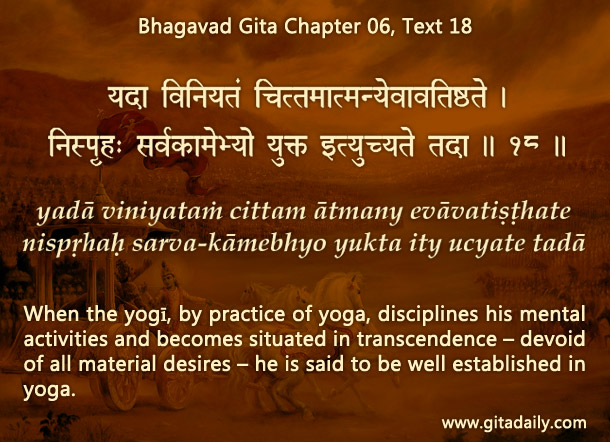Bhagavad-gita (6.18) depicts how the mind of a purified yogi becomes steady, like a lamp in a windless place.
We are often confronted with the problem of our mind becoming unsteady or even unruly. The state where the mind is steady, like a windless lamp, means that it can enable us to focus at an enormous level. Much of our energy is underutilized because our attention is dissipated, thinking in terms of, “What if?”—what if this happens, what if that happens, what if I were like that, what if that person would be like that—instead of focusing on what is.
This means not just focusing on the immediate physical reality confronting us but also on the ultimate spiritual reality that envelops, enriches, and energizes us. As our realization of that higher reality becomes clearer, deeper, and sweeter, we are no longer driven by the stormy winds of the mind. It naturally becomes steady, not by sheer determination that holds the mind still, even when fears and desires try to drive the mind from one corner of the universe to another, but by perceiving a higher, richer reality that raises us above those fears and desires.
Until we get that perception, determination is necessary. However, during the time of meditation, it’s important that our focus doesn’t get caught merely in intellectual discipline. Instead, once we begin to get a connection, a glimpse, an experience—a moment of spiritual insight—it can surpass the effects of intellectually or egoistically forced discipline. That glimpse is driven by the conviction that it is the right thing to do, rather than rigidly thinking, “This is what I have decided, and this is what I will do, no matter what.”
The more we get our priorities right, meditation becomes steady, even when our mind is unsteady, because our purpose is not primarily to steady the mind but to connect with the Divine, who will steady the mind for us. Progress may be slow, but it will be steady, bringing about a harmonization of the mind through absorption in the Lord.
This shift happens when our focus moves from being driven by the question, “What if?” to the question, “What is?” The latter arises from our increasing awareness of the Divine, who is always present within and without, encircling, energizing, and enriching us. The mind becomes unsteady due to the many desires and fears that populate and pollute it, but it becomes steady when it realizes a higher reality—one that helps us understand that there are bigger, far better things in life than the things we desire or fear.
Rather than rigidly, intellectually, or egoistically trying to enforce discipline on the mind, we should seek those moments of spiritual experience that organically steady the mind.
Summary:
- The mind becomes steady not by forceful determination but through the perception of a higher, richer reality.
- Meditation becomes steady when we shift our focus from “What if?” to “What is?” by connecting with the Divine.
- Spiritual experiences bring organic steadiness to the mind, surpassing the effects of forced intellectual discipline.
Think it over:
- What actually makes the mind unsteady?
- How can we change the question that drives us so that we can become steady?
- Is steadying the mind a function of determination alone, or does it also depend on perception?
***
06.18 When the yogī, by practice of yoga, disciplines his mental activities and becomes situated in transcendence – devoid of all material desires – he is said to be well established in yoga.


Leave A Comment